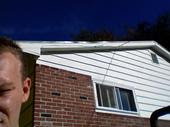 Bill Berkson
Bill Berkson,
Sudden Address: Selected Lectures 1981-2006. True to the title, these are not “essays” at all, just the poet-critic-“art historian without portfolio” being chatty and wise about Philip Guston, Frank O’Hara, Walt Whitman, Dante, and other dead friends. “Rhetoric is a bobbin-tension. Can’t we have a simple active thread?” Most of the talks seem to have been accompanied by slideshows, and one misses the illustrations here. Guston is a major presence in nearly every talk (in company with Piero della Francesca, Cézanne, Chardin), and I kept interrupting my reading to go find a photo of the picture it was telling me about.
Marcella Durand, Western Capital Rhapsodies. I lucked into this at the library, and wanted to read it twice, but now somebody has it on hold. Poems of incredible sharpness and intricacy of visual detail, rendered in a fluid, constantly surprising syntax. Way entertaining. The book balances on two 25-part sequences, “City of Ports” and “Machine into Water.” The former is my favorite, perhaps because it distills so many themes that I’ve been interested in in my own recent poetry (traffic, construction materials, architecture, geology, landscape) with a precision and freshness that humble and challenge me, and a formal grace I don’t even approach. Here’s a sample, “City of Ports 14”:
An annoying noise, a buzz
penetrates miles of quarry rock
and weakens basalt structures:
the flying buttresses think of
falling, taking their grainy wings
and centering angles back
to the ocean floor they first
spilled out of, that and the
meteorites flashing inward,
drawn mothlike to the trembling
blue green glow of a living
atmosphere. In impact the tiny
heavy spheres, drilled by another
thousand smaller bits, spark
off a swell, a wave, an undulation
in the crust of beaten gold, and
speak messages deeper to the inner
planet circling on its own,
wrapped in a field of
direction.
Benjamin Friedlander,
A Knot Is Not a Tangle. A quick flutter of diaphanous lyrics wrapped in several layers of self-mocking apparatus. There’s a note on the manuscript, which was edited by Kimberley Filbee, then a note from the U.S. Postal Service in Buffalo (“The enclosed article was damaged in handling” etc.), then a prefatory invocation beginning “Dear Poet,” then the poems proper (“Vomit Scape,” “This Is Just to Say,” “Until It Sounds Just Like Philosophy” and “A Child’s Garden of Verses” among them), then the Editor’s Envoi in three parts:
A, “Partial Objects” (poems with missing words indicated by empty brackets, á la Davenport’s translation of Sappho’s fragments);
B, “Unused Titles” (“From the Mixed-up Files . . .” “Easier Said Than Done,” “In Basil Rathbone’sVoice,” “Rankle” and dozens more); and
C, “Facsimile Chapbook Attributed to Bernie Fox,” supposed to be from the sixties by a dead and forgotten poet, with an editor’s afterword that pushes all the Borgesian buttons. The tone of the whole book is bitter, ironic, terse, offhand, funny-but-don’t-laugh, dead-on in its run through all the tones of our depressing cultural moment.
George Oppen,
Selected Poems (edited by Robert Creeley). I saw Glen Mott read in New York last month, and he prefaced his own poems with three sections (10, 18 and 19) from
Of Being Numerous, saying “I think this is absolutely contemporary” and of course it is. I wasn’t prepared for the speed and fluidity and almost hallucinatory quality of late poems like “From a Phrase of Simone Weil’s and Some Words of Hegel’s”—so different from the monolithic, jerky prosody of
Discrete Series (which incidentally is underrepresented in this selection—only two short poems!).
John Cowper Powys,
A Glastonbury Romance. I’m just getting started with this one, my doorstopper for the summer. Pure fun from the first impossible sentence. Of course Powys was a mystic and a crank (Colin tells me he claimed to be a reincarnated brontosaurus to boot!), but he was also a great realist, if that word has any meaning—an imaginer of nature and of human being in all its diversity and complexity, with all the senses, silly, daily, trivial, mythic, what’s there to be communicated.











